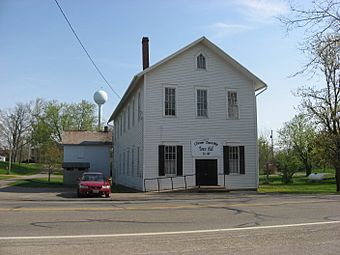Chester Town Hall (Chesterville, Ohio) facts for kids
Quick facts for kids |
|
|
Chester Town Hall
|
|

Front and western side
|
|
| Location | Sandusky and South Sts., Chesterville, Ohio |
|---|---|
| Area | Less than 1 acre (0.40 ha) |
| Built | 1867 |
| MPS | Chesterville MRA |
| NRHP reference No. | 79002752 |
| Added to NRHP | August 21, 1979 |
The Chester Town Hall is a really old and important building in Chesterville, Ohio, United States. It's where local government meetings happen, and it's also a place for people to gather. This building was put up in the 1860s by the village and a special club called the Independent Order of Odd Fellows. For many years, it has been used by both groups. It also provided space for officials from Chester Township and hosted many community events. Like several other buildings in Chesterville, it's now recognized as a historic site.
Contents
Chesterville's Early Days
The area around Chesterville was one of the first places settled in Knox County. Pioneers started arriving here shortly after 1803. Chester Township was officially created in 1812. Things slowly started to grow after the War of 1812 ended.
A merchant named Enos Miles moved to the township in 1815. He planned out the village of Chester in 1830. For its first few decades, the village did very well. Many schools were built, and grand Greek Revival style buildings appeared. However, Chesterville hoped to be the main town, or county seat, when Morrow County was formed in the 1850s. It lost out to Mount Gilead. This made Chesterville's growth slow down. The village became an official town in 1860.
How the Town Hall Was Built
One of the active groups in Chesterville was Lodge 204 of the Independent Order of Odd Fellows. This club started in 1852. After a few years, the club was doing well and even owned its own meeting hall.
In 1867, the Odd Fellows joined with the village to build the new town hall. The club paid $1,200 to build the top floor of the building. The hall was used for village meetings. It also became a community center for everyone. In 1880, people even talked about adding a stage for performances. It ended up being a place where music was played for some time. Later on, officials from Chester Township also started using the building.
What the Building Looks Like
The Chester Town Hall sits on a strong foundation made of sandstone. The outside walls are covered with weatherboard, which are long, thin wooden boards. It has a metal roof with one chimney sticking out.
The building is two and a half stories tall. The front and back of the building are narrow and rise to a pointed roof, called a gable. The sides are much longer than the ends. There are fourteen windows on the sides. The front of the building has six sash windows. There is a small window in the gable, and two on the second story. On the first story, there is one window on each side of the main entrance. The main entrance has double doors in the middle of the first story. The windows on the first story of the front have shutters.
Keeping History Alive
In the 1970s, a group called Chester Community Concerns was formed. Their goal was to help save the old buildings in the village. In 1978, this group helped to record all the historic buildings in Chesterville. This was part of a survey to find important historic places in Ohio. Their main goal was to get the most important buildings listed on the National Register of Historic Places.
In August 1979, nine buildings in Chesterville were added to the Register. These included the town hall, the Methodist Church, and several historic homes and businesses. The town hall was chosen because its old architecture was well-preserved. It was also important because of its role in the local history of Chesterville.
 | Selma Burke |
 | Pauline Powell Burns |
 | Frederick J. Brown |
 | Robert Blackburn |



